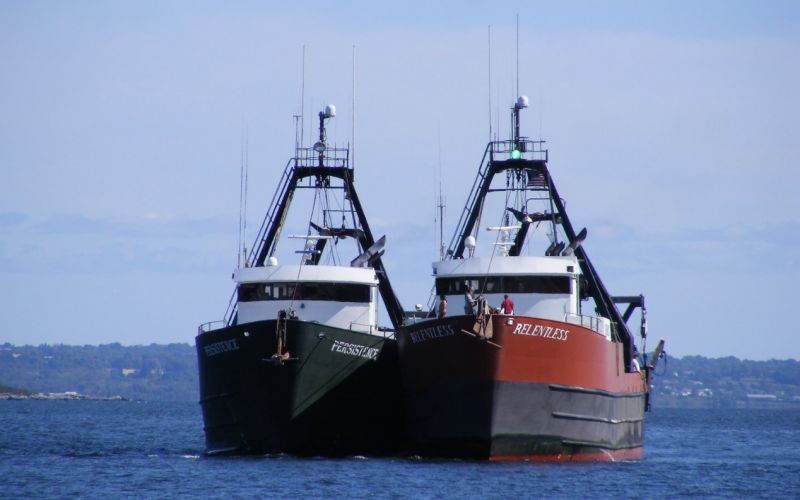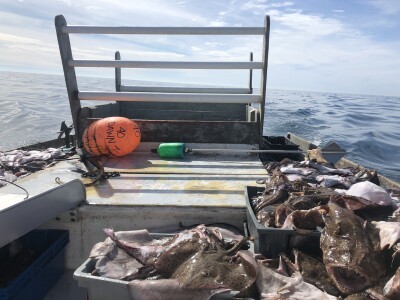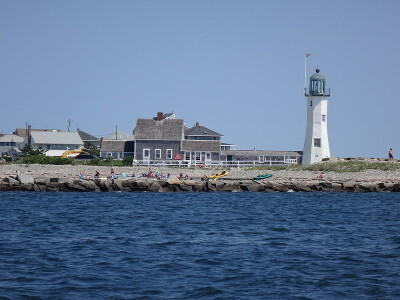A conservative legal foundation filed its opening papers in a U.S. Supreme Court case on behalf of Rhode Island fishermen, challenging a National Oceanic and Atmospheric Administration rule requiring herring fishermen to pay for at-sea government monitors on their fishing boats.
Lawyers with the New Civil Liberties Alliance worked with Point Judith, R.I., fishermen who operate companies Relentless, Inc., Huntress, Inc., and Seafreeze Fleet, LLC to develop the case, now dubbed Relentless v. Department of Commerce. The high court is scheduled to hearing oral arguments Jan. 17.
The Relentless case is proceeding in tandem with a similar case that another activist group, the Cause for Action Institute, is bringing to the Supreme Court on behalf of Loper Bright Enterprises and other Cape May, N.J. herring fishermen.
The cases challenge a 2020 rule imposed by NOAA that required vessel operators to pay for observers on their vessels at sea, at a cost that owners say can exceed $700 daily and sometimes exceed the money they make from landing low-priced herring.
NOAA waived the rule earlier this year as it ran short of money to administer the program. But fishermen want to make sure the observer requirement is not renewed, and conservative advocacy groups see their cause as a chance to overturn a long-standing precedent called the “Chevron deference.”
Named for a 1980s court case between the oil company and environmental activists, the Chevron deference established a principle that federal courts should defer to agencies like NOAA in their interpretation of ambiguous law. In the matter of herring fishing, the agency deciding it had authority to demand payment for observers.
But Congress never authorized that power to the agency, the legal activists say. The Chevron deference has become a cause célèbre among conservative legal groups, who see it as a vast overreach by what they refer to as “the Administrative State.”
A split in decisions among federal appeals courts has set the stage for possibly overturning the Chevron deference.
In its ruling on the Cape May fishermen’s case, the First Circuit Court of Appeals in Washington, D.C., “decided that broad ‘necessary and appropriate’ language in the Magnuson-Stevens Act, which governs U.S. fisheries, augmented the agency’s regulatory power,” according to a narrative from the New Civil Liberties Alliance. “It then relied heavily on Chevron deference to uphold the agency’s ostensibly reasonable interpretation of a supposedly ambiguous federal statute.”
However, the Fifth Circuit Court of Appeals in New Orleans, La., rejected similar arguments by government lawyers for NOAA in defending another agency rule requiring Gulf of Mexico charter fishing operators to submit to tracking of their vessel movements.
The Rhode Island fishermen’s case should push to Supreme Court to a reconsideration of the Chevron doctrine, according to the NCLA.
“The Relentless brief highlights two core problems with Chevron deference that NCLA founder Philip Hamburger has pressed for years,” the group said in a statement Monday. “First, employing such deference abandons a judge’s Article III duty of judicial independence. Second, when a federal judge defers to an agency’s legal interpretation, It denies due process of law to the entity opposing the government in that case. The logic of Chevron deference cannot withstand this withering dual critique.”
Even if the Chevron doctrine survives, “the NOAA fishing boat surveillance rule must be vacated as unlawful under any sensible reading of the Magnuson-Stevens Act, which governs U.S. fisheries. The MSA directs fishermen to pay for monitoring in only three specific cases," according to the NCLA.
“It does not direct monitors to be paid by the regulated fishermen in the New England herring fishery. This can only mean one thing: the government itself must pay. That was the rule for 20 years until the administrative agencies used Chevron to change the law.”







